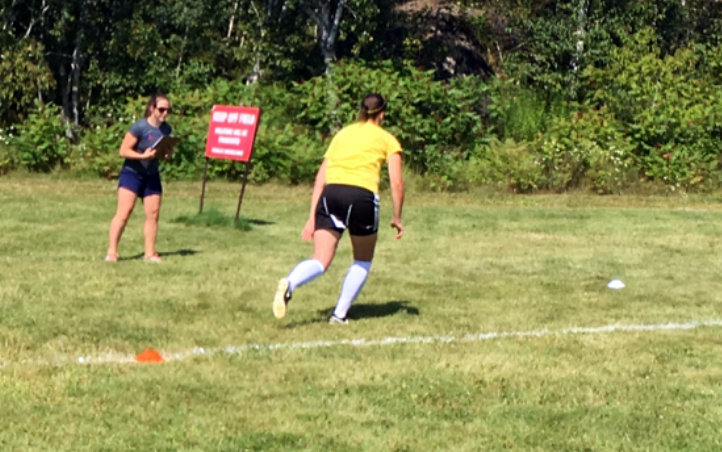Injury prevention is something that I value greatly. As a Physiotherapist, I see many athletes struggling to return to sport and, in some cases, making the life-changing decision to stop playing the sport altogether. This is a very challenging journey and one that I, too, understand
MY INJURY STORY
I would like to share my experience with you so that you can understand it may be a long road, and that injuries force you to make a lot of decisions.
I was 19 years old and I had worked my butt off to gain a starting position, as the goalkeeper on a varsity team in my rookie year. I was on Cloud 9 and stayed there until the day of my injury.

I remember it like it was yesterday. When it happened, I told my coach not to worry, I’d rest up and I’d be at practice on Monday. However, I never made it to practice — instead, for the months that followed I spent countless hours in rehab, endured multiple flare ups and began to experience a loss in muscle strength and an emotional roller coaster. My heart was broken: I knew I was facing a hiatus from the sport I loved.
After many attempts to strengthen my knee without surgery – it came to a point where my knee would give out while simply running in a straight line. I knew surgery for ACL reconstruction would be the best route to take.
After 12 months of rehab, I was finally getting back into the swing of things when I tore my meniscus in the same knee. Back to the operating room I went; the rehab cycle started again.
I was hopeful and determined. I was making strides, slowly but surely. As I worked hard to regain my physical strength I kept my mental game strong by attending all practices, games and cheering on my teammates. I wasn’t ready to let go, playing soccer was all I ever really knew. I started training again for my sport and noticed I was timid on challenges and hesitated on plays.
That’s when the worst pain set in. The pain of knowing in the back of my mind that I had lost my edge. I knew in my heart that it was time to call it in but making that decision felt impossible.

WHAT’S NEXT FOR ME?

Physical injury quite often pays a toll on your mental state. Many questions plagued my mind as I tried to decide my fate in this sport.
- What will I do if I am not playing soccer?
- What will happen to my knee if I continue to play at this level?
- Am I susceptible to more injury?
- What will happen to the relationships I built with my teammates?
- How will my parents feel (they are part of this community too)?
- Am I a failure?
- Will I get lazy?
- How does this affect my life in 10 – 20 years from now?
- Will I be active as I age?
Only I could determine the answers to these questions. I couldn’t go back; I couldn’t blame my parents, coach, teammates, doctors or therapists. Only I could decide what was best for me.
Like many athletes who suffer from injuries, this decision is life-changing. How do you make the decision to stop playing the sport that defined you for the majority of your life? It’s not an easy one.
THE JOURNEY IS THE REWARD
Don’t get me wrong, I have witnessed countless athletes return to playing high-level sports after similar or even more serious injuries. My story is about my personal journey and meant to help those see that sometimes a change in direction is ok; it’s not meant to discourage those that are going down the path of returning to their sport.
This injury turned out to be a very positive thing for me (as they say, “every cloud has a silver lining”), however, understand that at 19-years-old, wasn’t easy. Looking back, it has shaped me and obviously led me into a career dedicated to injury rehabilitation and prevention.
August 16, 2017, marked 13 years since I had ACL reconstruction surgery. How fitting that it was also the first day that the Physiotherapy staff at Real Life Health initiated The FIFA 11+ ACL injury prevention program with the Laurentian Women’s and Men’s soccer teams.
Through my journey, I vowed to return to Laurentian to implement an ACL injury prevention program. I wanted to help others prevent the injury that devastated me and ended my soccer career. I am so thankful to have this opportunity with Laurentian’s Soccer programs and I am proud to be able to offer an injury prevention program that will help athletes achieve their goals by insulating them from injury and improving their performance.

I don’t regret my decision to stop pursuing and playing soccer. I had many opportunities to learn new things about new sports. I found new interests and redirected my priorities to a lifetime of health and wellness.
People often ask, “Do you have pain in your knee?”, to which the answer is yes, sometimes I do. I know it will be a lifelong journey to maintain the strength and health of my joints (especially my knee). The scars on my knee remind me of my journey and they welcome me to a club of many others who have gone down a similar path. A path that, though different than the one a younger me expected, continues to get better. See you shortly for Part 2!
This post, by Kristin Green Registered Physiotherapist, was originally posted on Real Life Health.



Comments are closed